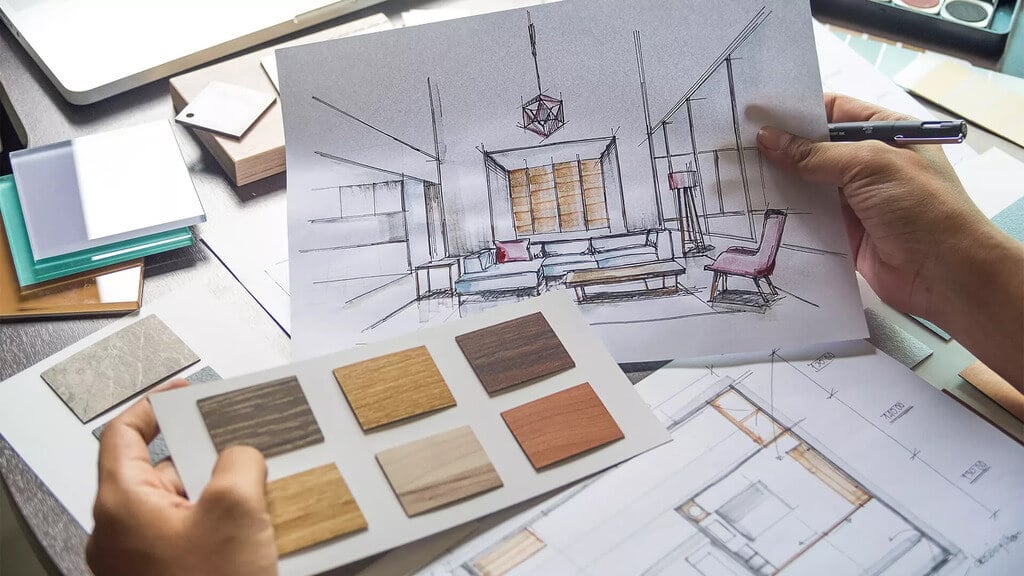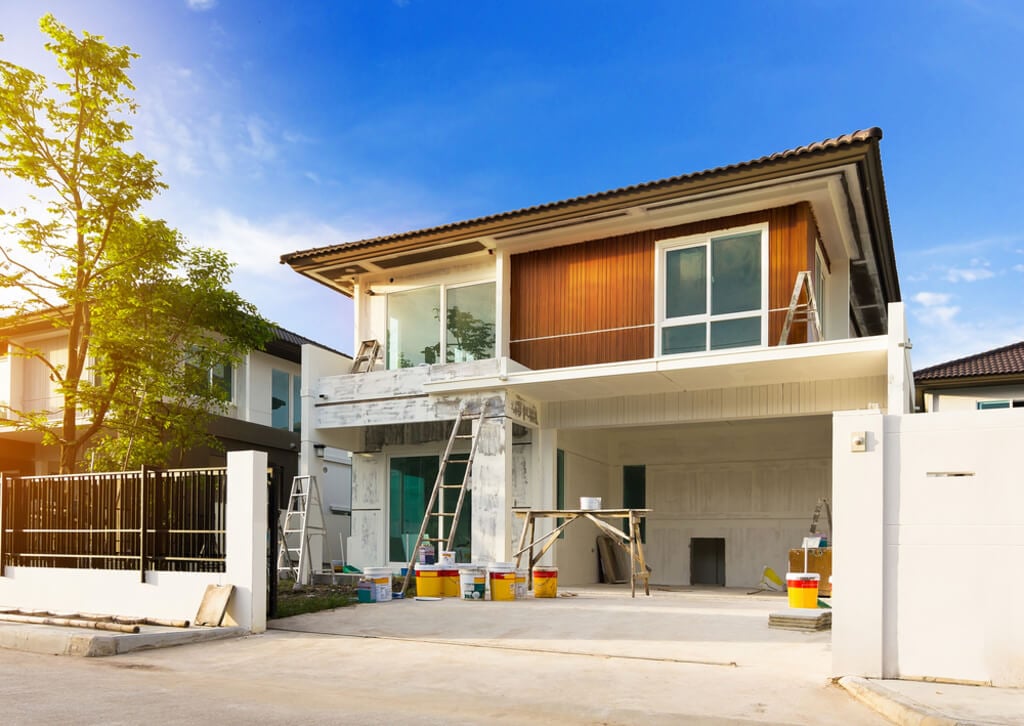When done properly, home renovations can be extremely gratifying and highly transformative. Home remodeling is a rewarding experience whether you are renovating entirely or just a part. It’s like an adventure. If several things could go wrong, many would eventually result in the perfect idea. Many homeowners begin without any prior knowledge of what to anticipate. While you must start your home renovation somewhere, it is best to plan ahead.
Where to Start with Home Renovation?
You’re aware that your home indeed needs a renovation. But the big question is, where should you begin? Anticipate, ideate, and execute. With a home renovation, you are never starting from scratch. The structure already exists.
You are modifying it to something more contemporary and functional. Home renovation always begins with anticipating the need for renovation. After that, you must ideate or create a plan with an idea revolving around your home. Finally, start by looking for the right vendors to understand and execute your vision.
Steps to take When Renovating a House
If you are wondering how to get into house renovation, here are ten things you must take into account before the actual planning.
1. Set your Goals
Your newly purchased home needs remodeling and maintenance, prompting renovation. A gazillion ideas are racing through your head. Yet, you can only accomplish some of them. Begin slowly by setting goals and priorities.
Consider the structural elements of your home, requiring urgent repair. These could be pipes, windows, ceilings, etc., that need immediate attention. Then, take note of areas with the most traffic in your home, such as the kitchen. Run your list by the contractor and get ideas and recommendations from them.
2. Budgeting

Now that you are clear about the spaces in your home that require a structural modification, you will train your focus on the budget. Get quotations from at least three vendors to gather a fair idea about your expenditure for the project. Most of the contractors will be happy to visit your site to give you a free quote. You may try to cut the costs.
But you must also remember that getting something cheap may not necessarily mean getting the quality you seek. Once you have set your budget, consider setting aside some extra money for unforeseen expenses. This way, you don’t have to jump into panic mode when things go wrong. For major renovations, look for financing options such as a home equity loan, which could complete your project faster.
3. Duration
It is pretty apparent that time is a leading factor that drives any project. A renovation takes time, primarily when you work on several areas simultaneously. You must set deadlines with the contractor and get a tentative timeline for the completion of the renovation.
Go a step further by using technology to support your planned schedules. Make entries on a spreadsheet and mark delays or slippages. Examine your calendar. If something requires your complete focus, such as a marriage or childbirth, put the renovation off until you accomplish these life events.
4. Working with an Interior Designer or an Architect

Seek professional advice from a designer or an architect with drawings, planning permissions, and more to evaluate the completion of your project. When you hire a contractor, you learn more about the physical alterations to the structures. You must be aware of the revisions included in the offer and whether they correspond with the office and the said rates. Observe the plans and make sure everything is accomplished with no compromises. Watch out for concepts that may sound beautiful on paper but don’t actually serve the purpose.
5. Lifestyle Modifications
Renovation projects can dramatically upend your environment. They can profoundly affect your mental health as they alter your lifestyle. Check if you need temporary housing elsewhere. This must be planned well in advance – before the project begins. It can be challenging, especially if you have children. See if you can comfortably relax and apply your daily routine with the workers. Otherwise, it is best to choose another stay.
6. Psychological Well-being
A renovation brings excitement and the fun of carving something new from the existing. However, did you know? Remodeling your home can be lengthy, and you must be mentally prepared to sacrifice many things before you embark on such an elaborate project. Besides, you must also be ready to alleviate your fears when things go awry.
7. Get Your House Ready for the Renovation
Things could get damaged during a renovation. Before the makeover, you may want to lay down dust sheets, cover up furniture, etc. The process does add to the thrill of home renovation. However, you must keep one room free that will make you feel at home no matter how work proceeds in the others.
8. Interior Designing

Interiors are a critical part of home remodeling. Get interiors with the best combination of design and functionality. You must try to provide strategies yourself, even if you hire a professional. Work on the colors, textures, mood boarding, sampling, and visit vendors to see what’s best for your home. Designers must be involved in the project right from the start. This way, the chances of completing the project sooner are greater.
9. Regular Discussions
Another pertinent factor to consider as you are renovating your home is having continuous dialogues with the contractor before and during the actual undertaking. Some customers tend to provide instructions and then vanish, only returning to botched work. Stay in touch with the professional and monitor the situation. This way, you can prevent a mistake before it even happens.
10. Dust Precautions
As trivial as it might seem, you will be surprised to find how dusty renovation can get. Every crevice gets grubby, making room for a ton of allergies. This is true, especially for those suffering from asthma or other dust-related allergies. That is why it is vital to urge the contractor to take precautions before tearing the space down. You could get them to install an air purifier, maybe.
It is absolutely essential to know how to really refurbish your house. A plan, along with a checklist, might actually do the trick.
How to Properly Renovate a House?

When combined with your budget, skill levels can set you up for success. Even the most minor repair will benefit from some initial planning, considering its scope and expense. Here are certain things that you must check to renovate your home like a pro.
Do You Really Need Remodeling?
Decide why you want to make a modification before drafting the home expansion plan or kitchen makeover. Maybe your plumbing must be fixed, or a room has to be rendered more functional. Understanding the initial motivation behind a home remodeling can help you align your priorities straight.
Only after you have decided whether your home needs improvement will you choose where to start with home renovation. Some reasons to remodel your home may include:
- Repairs and maintenance
- Selling the property
- Trying out new decors and styles
- For more functionality
- What or which part are you actually renovating?
Take a daily report on the work done so that you can tail the trajectory of the project. Ask questions if you have doubts or if the renovation is not going as per your wishes. Look for inspiration in various places, including magazines and online sites. Check out popular home improvement projects that include pricing with a breakdown. For instance, you could look for maintenance-related projects that list out plumbing, electricals, heating, insulation, ventilation, and more.
Relevant Permissions According to Regulations
Submit a written application for permits, if necessary to local authorities in your area before commencing the renovation work. Permits are imperative to ensure work is accomplished appropriately to designated standards without posing a threat or harm to you and your neighbors.
For instance, structural renovations of your home call for a permit, especially when you add extensive electrical work or make significant alterations to plumbing. Check if you can get a permit online and if a small fee is attached to obtain the same.
Latest Styles and Trends
Stay abreast of the latest trends even when you are repairing your home. It is best to invest right then, as you are adjusting your functionalities. Start by browsing online to get a general sense of the project. An independent study determines the style that appeals to you the most.
Realistically consider your budget and map it to how you want the area to look. Look at chic, trendy, adaptable styles, matching minimalistic and modern aesthetic themes. If you make it too functional without focusing on trends, your house may look outdated. Trends could include new recessed lighting, color changes with a futuristic crimson, or replacing furnishings.
Scope your Project
The scope of work depends on the budget, including your washbasin, shower, and toilet redesign or any other plumbing work you may want to accomplish. Significant expenses can, indeed, limit issues with any area of the house. However, you might want to consider enormous costs, such as removing a portion of the wall.
Anticipate the time of your project. Remember that the larger it is, the longer it takes. Consider difficulty grades if you are going to stay in the house during renovation. Alternatively, opt for temporary relocation, which could also cost significantly. Don’t jump into upgrades urgently. Take the planning process seriously.
Renovating the home is a big decision. Remodeling can be physically and mentally draining, especially without proper safety measures.
Home Renovation Safety Tips
Whether hiring a professional or doing it yourself, home remodeling can be stressful. Use well-planned and thought-over strategies to stay secure, healthy, and unruffled as you remodel your home. Here’s some home renovation advice for you.
1. Pre-Examination of Structural Safety
Before remodeling, check if your home’s construction is structurally secure. With older house renovations, there is a danger of weakening of the foundation. Some homes have foundational issues due to prior flooding or water logging.
You must request the consultation of a structural engineer to examine the foundation and prepare a report outlining the best security practices. Starting from the basement, look for glaring structural failures. Check for cracks, mildew or mold, water intrusions, or rotting wood.
2. Carefully Planning the Pre-Construction Stage
Before remodeling, the overall extent of the project must be pre-defined and well-charted. Renovations can become long-drawn affairs if this stage is botched. This could result in hurried, costly, and dangerous choices, mainly when the construction specifics are not defined. Pre-existing legal issues and work done on the property must be examined to assess any safety risks that may occur during remodeling.
3. Keep the Living Area Separate from the Renovation Area
Living somewhere else while remodeling your house can be expensive. However, you must protect the functional part of your apartment from the other getting renovated. Even while there won’t necessarily be any risks due to the renovation, it can be needlessly difficult when you live there.
Be ready to tolerate the ongoing construction activity if you still want to stay in one part of the house during renovation. Never bring children near the site; ensure proper packaging instead of covered sheets. However, work progresses quickly when the home is vacant during remodeling, which is a risk mitigator in itself.
4. Keep the Workplace Tidy
Always ensure a clean and tidy workplace and wear appropriate clothing at all times. An organized site has everything in its place, well-labeled and protected. A suitable office area should be designated with documents and guidelines, for instance, dispose of waste correctly.
Display all obtained permits, if required. Include gloves, a pair of pants to cover the legs, belts to protect the waist for lifting large and heavy objects, a construction cap, and steel-toed boots where demolition and construction are involved. Pack a pair of safety glasses to shield your eyes from flying debris. Check if tools are properly unplugged before closing work on a daily basis.
5. Check for the Functionality of Smoke and Carbon Monoxide Detectors
These crucial pieces of equipment for household safety must always be functional. For instance, contractors cutting concrete in basement remodeling should be cautious about dust and silica exposure besides carbon monoxide produced by gasoline-powered machines.
If the family lives in the house during renovation, isolate the space as much as possible with plastic sheeting alongside an operational carbon monoxide monitor. Such detectors must work since gas exits the house through pipes and chimneys. Moving things around during a renovation can unintentionally block these airways.
6. Presence of Black Mold
There are chances of disrupting and aerosolizing a sizable amount of mold, which can cause airway restrictions or sinus issues in allergic individuals. The Centre for Disease Control states that even short-term exposure to mold can cause flu-like symptoms such as wheezing, skin irritation, or itchy eyes.
Prolonged exposure can result in fever, nausea, or shortness of breath. Black mold resembles black particles and is easily identifiable. For instance, you can find them behind the bathroom wall. Hire a mold removal specialist, whether it’s a large or tiny area. Alternatively, attempt to wash it with bleach and cover it with paint.
7. Concerns about Dust
Scraping plaster or demolishing a wall involves a lot of dust and is one of the most significant issues during a house renovation. Those with sensitive airways are at the greatest risk. It could include individuals suffering from COPD, asthma, and congestive heart failure, to name a few.
Babies and toddlers are at risk, too, due to the tiny size of their airways and still-developing lungs. Change the air filters often, particularly during remodeling that involves a lot of dust. Wear a mask. Light sneezing and coughing, however, is usual, but when you begin coughing up phlegm or develop a fever, you need medical attention. Use available specialized equipment to deal with dust control.
8. Electricity
Last but not least, turn off the electricity during electric work. It might seem trivial, but cutting off electricity from the circuit breaker is essential when working with power.
Conclusion
Remember, especially when placing your house on the market, a house prep helps boost its price. Even if they are minor repairs, painting the house, or a trendy splash of appeal will help augment property value and eventually with its resale. When the end goal is selling, house renovations can maximize ROIs.
Renovation can be stress inducing and at times cause you both mental and physical duress. Therefore, for the sake of your sanity, plan ahead and keep some free time for yourself to unwind from the day’s stress. Take a periodic rain check on your emotional and physical health during the renovation. Do all the necessary research beforehand, such as setting aside money or preempting probable issues. Recognize that you might need professional and medical help at any point in time.
Explore Further:-
- Home Renovation Guide: Everything You Need to Know
- How Long Does It Take to Renovate a Home?
- 10 Ways to Renovate Your Home, Your Way, At Your Budget!
